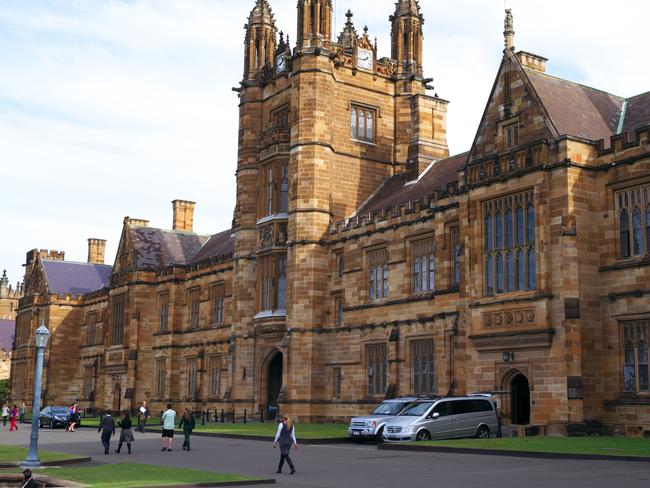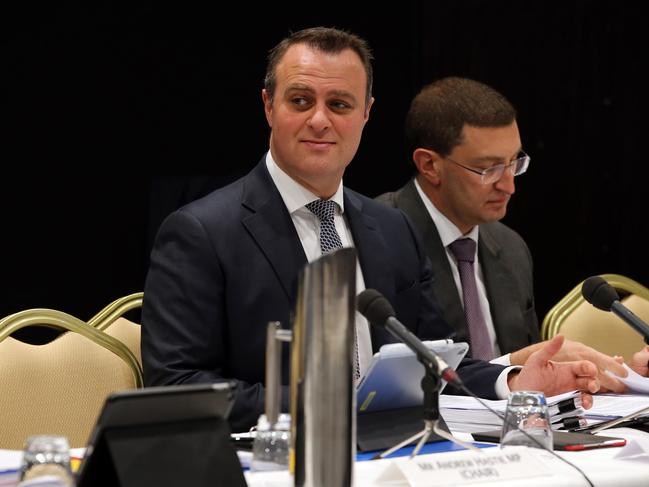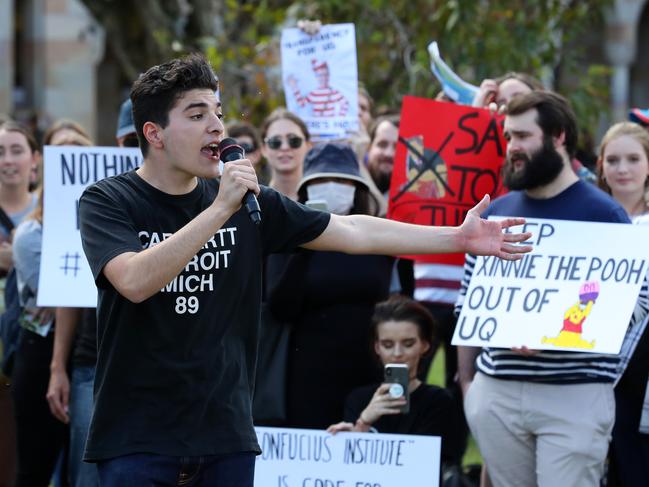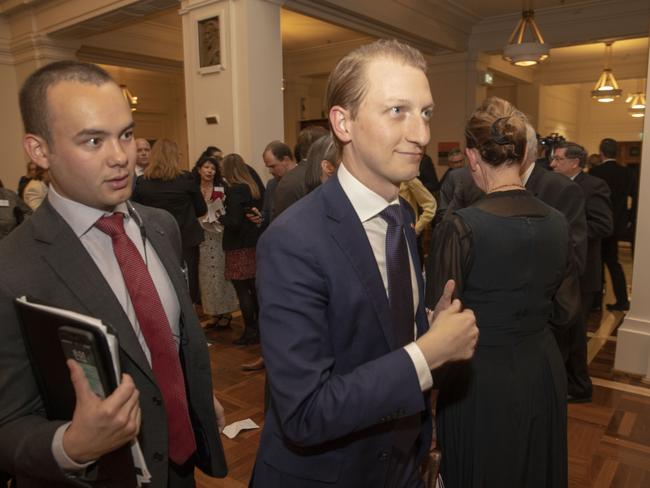Australian universities with links to China’s Confucius Institutes defy transparency
China’s Confucius Institutes are becoming increasingly controversial in the west with Sweden closing them down. Yet they continue to operate in Australia without being held accountable for their influence.
Exclusive: Australian universities are defying political pressure and refusing to list their China-backed Confucius Institutes on the national register of foreign influence.
None of the 13 local institutes are on the Foreign Influence Transparency Scheme register, despite concerns they’re being used by the Chinese Communist Party as a tool to exert “soft power’’ and spread propaganda.
The institutes, which teach Chinese language and culture, are becoming increasingly controversial in the west, with Sweden last month closing the last of its “Confucius Classrooms’’, which are conducted in primary and high schools.
The country had already closed its university-based institutes.
In the United States, a third of the 100 Confucius Institutes attached to American universities have been closed.
In Australia, the Attorney-General’s Department wrote to the Institutes in March last year asking them to consider whether they should voluntarily sign up on the register, which tracks lawful influence activities by foreign countries and entities.
But the Institutes told News Corp they had assessed their activities and decided they did not need to be registered.

The Queensland University of Technology’s Vice-Chancellor and President Margaret Sheil said “careful consideration’’ had been given to the FITS scheme.
“The activities of our Confucius Institute only involve the teaching of Chinese language. We do not believe there is a requirement to register the Institute under the FITS legislation,’’ she said.
The University of Sydney said its Confucius Institute was overseen by a governing board chaired by a Deputy Vice-Chancellor.
“The board is satisfied that none of the Institute’s activities require registration under the Act,’’ a spokesperson said.
The comments were mirrored by other universities. Ten of the 13 universities responded to questions from News Corp and said they had assessed the activities of their institutes and did not believe they needed to be included on the register.
But Members of Parliament, who have been critical of China’s growing influence in Australia, questioned the failure of the institutes to be registered – either voluntarily, or through enforcement activity by the Attorney-General’s Department.
The issue has taken on added impetus as the relationship between China and the west deteriorates over the Chinese Communist Party’s cover-up of the coronavirus outbreak.

“It’s clear Confucius Centres are a soft power vehicle to influence countries to a Chinese Communist Party-sanctioned view of China,’’ Victorian Liberal MP Tim Wilson said.
“When it comes down to it I have a low confidence universities will choose principles over a pay day, so it is better to have them registered and observed, especially as we know some cultures work on long timeframes for expanding their influence and need to be tracked.’’
Named for the ancient Chinese philosopher who espoused the values of knowledge and loyalty, Confucius Institutes began to roll out in 2004, and there are now almost 500 operating at universities across the west.
Funded by Beijing, they are a joint partnership between a local university, a Chinese university, and the Chinese Government Office of Chinese Language Council International, known as Hanban, which is connected to China’s Ministry for Education.
Ostensibly, they teach Chinese language and culture, organise study tours, and provide a learning hub for students interested in China.

In Australia, Confucius Institutes operate at the Queensland University of Technology, Griffith
University, the University of Queensland, University of New South Wales, University of Newcastle, University of Sydney, Charles Darwin University in the NT, the University of Adelaide, Victoria University, La Trobe University, RMIT, and University of Melbourne and the University of Western Australia.
Confucius Classrooms operated by the NSW Department of Education in high schools were shut down last year and there has been growing concern in Canberra about the wisdom of allowing China to establish bases in Australian universities, and what power it could potentially give Beijing over the universities.
The University of Queensland is currently pursuing 11 claims of misconduct against an anti-China student activist and protester, 20-year-old Drew Pavlou, who has been fiercely critical of the university’s academic ties with China.
One of the misconduct claims relates to a social media post he made about the Confucius Institute.

With western intelligence agencies including Australia’s increasingly warning about the rise of foreign influence activities by China, the institutes are coming under increased pressure with critics saying they give student a Beijing-orientated world view.
Björn Jerdén, from the Swedish Institute of International Affairs, told News Corp the four Confucius Institutes and four Confucius Classrooms in Sweden had closed.
“Different universities and municipalities have taken the decisions, the central Swedish government\ has not been involved,’’ Mr Jerden, the head of the Asia Program at the think tank, said.
“Three factors seem to have influenced the decisions.
“First, apprehension against allowing a non-democratic state to be directly involved in the education of Swedish students.
“Second, discontent about the deteriorating human rights situation in China.
“Third, displeasure with the Chinese government’s strident attitude against the Swedish government and Swedish citizens.’’
Mr Jerden said the first Confucius Institute in Europe had been located at Stockholm University in 2005, and had always been subject to debate, right up until its closure in 2014.
“The Swedish debate on the issue started well before the US and other countries started to adopt a more critical stance toward China in the last few years.’’

Mr Jerden said Sweden “probably has the worst relationship with China in Europe at the moment’’ – at least partly because of the jailing of Swedish citizen, the Hong Kong bookseller Gui Minhai, who had published books on the lives of China’s political leaders.
“The crisis (coronavirus pandemic) has not led to a rapprochement between the countries,’’ he said.
“China’s campaign of criticism against dissenting voices in Sweden continues. The Swedish government has criticised alleged disinformation about the Swedish response to the pandemic in Community Party media. Swedish media has focused mostly on negative aspects of China’s response to the crisis, which might further strengthen already critical public views on China.’’
The Australian Attorney-General‘s Department indicated its scrutiny of the Confucius Institutes may still be continuing, telling News Corp: “The department does not comment on ongoing inquiries or investigations under the Foreign Influence Transparency Scheme Act 2018.’’
The Foreign Influence Transparency Scheme register was set up in 2018 with the unstated intention of disrupting China’s foreign influence business model but the Government was humiliated when one of the first actions bureaucrats took was to ask former prime minister Tony Abbott to register as an agent of foreign influence.
He had been due to speak at a conservative conference.
The FITS bureaucrats also went after a conservative think tank head, Andrew Cooper, from Queensland.

Both Mr Abbott and Mr Cooper declined to register, and the department quietly discontinued their pursuit of them.
Attorney-General Christian Porter tried to change the culture of the people responsible, bringing in new staff and a new boss, but MPs are fast running out of patience.
Liberal Senator for Victoria James Paterson is a strong public critic of China’s influencing activities.
He contrasted university support for the Confucius Institutes to the outcry over attempts to establish study centres on western civilisation, funded by the late health entrepreneur and philanthropist Paul Ramsay, and featuring well-known conservatives such as Mr Abbott and former PM John Howard on its board.
“Any organisation funded by the overseas propaganda arm of the Chinese Communist Party should at an absolute bare minimum be on the foreign influence register and it is of great concern they have thus far failed to comply,’’ Senator Paterson said.
“But personally I question why any Australian university would be comfortable with these arrangements – particularly those who thought the Ramsay Foundation was a dangerous imposition on their academic freedom. If they are worried about the influence of a dead billionaire they should think very carefully about the wisdom of accepting money from a foreign government.’’

La Trobe University said it monitored its institute to ensure it remained compliant, and that: “assessments, backed by independent advice, have determined that the La Trobe Confucius Institute does not meet the registration requirements of the Scheme.
“The University has not received any transparency notices nor any provisional transparency notices,’’ a spokesperson said.
The University of Queensland said it had complied with its obligations, and the University of Newcastle said it did not believe the FITS was applicable to its Institute, as did Victoria University.
The University of Adelaide’s said its Confucius Institute was a small unit within the University’s School of Social Sciences (Faculty of Arts) which had been established in 2007 and “reinforces South Australia’s Sister State relationship with Shandong Province.’’
“Adelaide’s Confucius Institute focuses on the enhancement of intercultural understanding through the promotion of Chinese language and cultural awareness in the wider community, such as conducting language and art workshops in local primary and secondary schools. These workshops are run at the request of those school teachers,’’ a spokesperson said.
“Unlike the Confucius Institute model operating at some Australian universities, the University of Adelaide’s students are not enrolled in or taught through the Institute. Instead, students who are studying Chinese language at the University of Adelaide do so through courses in the University’s Department of Asian Studies in the Faculty of Arts.
“Teaching content and quality are determined solely by the University.’’
The UNSW said it had carefully reviewed the FITS legislation and its Institute was operating in accordance with legal requirements.
RMIT in Victoria said it would be guided by the Attorney-General’s office but believe its Confucius Institute, which focused on Chinese medicine, was not required to be registered.
The University of Melbourne said it had reviewed its Confucius Institute to ensure it complied with “the letter and spirit of the law’’ and did not believe it was involved in registrable activities.
